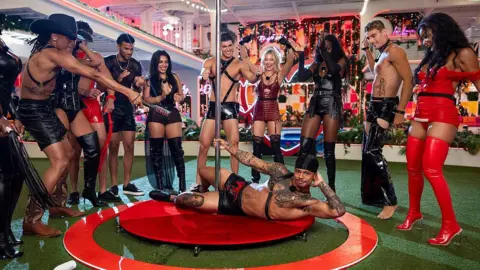BBC Information, Los Angeles
 Peacock through Getty Photographs
Peacock through Getty PhotographsLove Island USA – a derivative of the UK actuality sequence – is having its most-watched season but. However its newfound reputation has include a darkish aspect.
Contestants have been relentlessly cyberbullied on social media, a lot in order that the present aired a press release throughout a current episode with a plea for viewers to halt the harassment. Its host Ariana Madix echoed the sentiment, asking viewers to rethink their posts and the way they might affect the solid.
The present – which locations on a regular basis women and men in a villa in Fiji to compete and discover love – typically helps contestants safe thousands and thousands of social media followers, model offers and look requests.
However the downsides of in a single day fame have been well-documented for the reason that present’s begin 10 years in the past within the UK, with some contestants complaining about melancholy, nervousness and relentless scrutiny. Two contestants died by suicide after showing on the present, prompting the British authorities to launch an inquiry into actuality tv.
The present’s producers say they’ve realized from the fact franchise’s years of success how one can higher help solid and crew. However psychology consultants who’ve labored with actuality TV exhibits say it is an uphill battle.
 Peacock through Getty Photographs
Peacock through Getty PhotographsBehavioural psychologist Jo Hemmings, who has labored with actuality TV productions together with Huge Brother, stated the final 5 years have seen a number of constructive adjustments within the UK to handle welfare considerations – however these strides have not been as evident within the US.
“I do not assume responsibility of care has developed as far within the US because it has within the UK,” she instructed the BBC. “Possibly there is not the identical stage of welfare, help or transparency. I additionally marvel that with elevated political polarisation within the US, the cyber-bullying and threats could also be extra intense and widespread.”
She stated it is about attaining a stability when engaged on a actuality present. The core of many of those exhibits is outrageous emotional outbursts, sexual behaviour, aggressive insults and confrontations.
“Producers need pleasure and jeopardy,” she stated, however on-set psychologists are guaranteeing “stability and wholesome behaviours”.
Love Island, which has run iterations in additional than 20 nations, says it affords contestants help earlier than, throughout and after manufacturing, and continues to regulate its psychological well being choices to satisfy altering wants.
On the USA model, ITV America, which produces the present, employs an obligation of care consultant, two on-site psychologists and a welfare supervisor that helps islanders as a “non-producer voice” within the villa. All through filming, all solid members have an appointed psychologist on the villa – and examine ins may be initiated by an islander, as solid members are known as on the sequence, or the physician.
Earlier than they’re solid on the present, every contestant goes by means of a prolonged vetting by a psychologist. Contestants are additionally briefed about adverse press, social media interactions and public perceptions.
However this psychological well being consciousness has come from some exhausting classes. Because the present gained reputation within the UK, some complained about melancholy or nervousness after showing as a part of the solid. A number of have spoken out about ideas about taking their very own lives within the aftermath.
The suicides of former Love Island UK contestants Sophie Gradon and Mike Thalassitis in 2018 and 2019 prompted questions on how and the way effectively contributors are helped.
“You may earn some huge cash if that is what you need to do, however actually you have to take a look at the larger image and assume in 5, six, 10 years’ time, you are at all times going to be just about identified for being on a actuality TV present,” stated Zara Holland, who competed on Love Island in 2016 within the UK.
“It was a very exhausting time for me. And if I might flip again time, I actually want I might by no means gone on the present,” she instructed BBC’s Newsbeat.
Social media can act as a double-edged sword for contestants. Dr Jamie Huysman, who has suggested productions on psychological well being take care of greater than 20 years, famous it has “made it hell” for some. “It has really disassociated us from the affect of our phrases.”
Contestants need fame – however they don’t seem to be the one ones who really feel a rush by getting likes and followers on-line. Common viewers on social media are additionally chasing that very same gratification after they make memes or posts that turn into standard, and they’re typically incentivised to be vital, he says.
Ms Hemmings stated psychologists can encourage folks to disregard these criticising them on-line, nevertheless it’s troublesome.
“The general public may be fickle and harsh,” she stated. “They should do not forget that contributors are younger and bold, however may very well be their siblings, brothers, sisters or youngsters.”
She famous that in a single day fame can result in a cascade of points for contestants, which may be overwhelming.
“They yearn for it, nevertheless it brings unwelcome scrutiny,” she stated. “Their pasts are dissected. Exes come out of the woodwork to promote their tales, and the whole lot they do or say is open to criticism.”
One other complication is that “only a few actuality stars go onto profitable media careers – most wrestle or fade away”. However having a style of recognition could make it troublesome to return to their previous lives.
Season 7, which continues to be airing, has turn into the sequence’ most-watched season because it was launched within the US in 2019. Sports activities bars are internet hosting watch events, celebrities are spoofing viral moments on-line – Grammy-winner Megan Thee Stallion even appeared on an episode this season and gushed over her obsession with the present.
The present’s reputation within the US has spurred a spin-off dubbed “Past the Villa”, which is about to air subsequent month and comply with Season 6 Islanders as they navigate life in Los Angeles after the present.
However that success has additionally led to an increase in adverse feedback concerning the solid this season, who’ve been relentlessly criticised over their appearances and actions. The present broadcast a message this week in the midst of an episode: “The key phrase in Love Island is… Love. We love our followers. We love our Islanders. We do not love cyberbullying, harassment or hate.”
It adopted a public plea from host Ariana Madix: “Do not be contacting folks’s households. Do not be doxing folks. Do not be happening Islanders’ pages and saying impolite issues.”
Love Island USA’s producers didn’t say whether or not added psychological well being precautions could be taken after this season – however famous they overview and reassess such measures frequently.
 Peacock through Getty Photographs
Peacock through Getty PhotographsMembers of the solid should not have entry to their cell telephones or social media whereas on the island, however their family and friends have been responding to a number of the harassment – together with those that know contestant Huda Mustafa, a mom whose relationship with fellow Islander Jeremiah Brown has been closely scrutinised on-line this season.
The present has routinely defended itself and its cohesive psychological help system. Comparable critiques have been made towards actuality TV manufacturing broadly, boiling over in 2023 when actuality star Bethenny Frankel of the Housewives franchise sounded off on the therapy of actuality stars, dubbing it a “actuality reckoning”.
“Networks and streamers have been exploiting folks for too lengthy,” she stated, arguing those that seem on actuality programmes needs to be unionised.
The calls have been adopted by a number of lawsuits difficult “Love Is Blind,” the “Actual Housewives” franchise and “Vanderpump Guidelines” – the place Ms Madix rose to fame – over the therapy of the exhibits’ casts.
Suzie Gibson, a senior lecturer in English at Charles Sturt College, in contrast actuality TV stars to “modern-day gladiators, battling for love, fame and Instagram followers”.
“Audiences can dwell vicariously by means of their favourites, whereas hoping for others’ dismissal or ridicule.”


